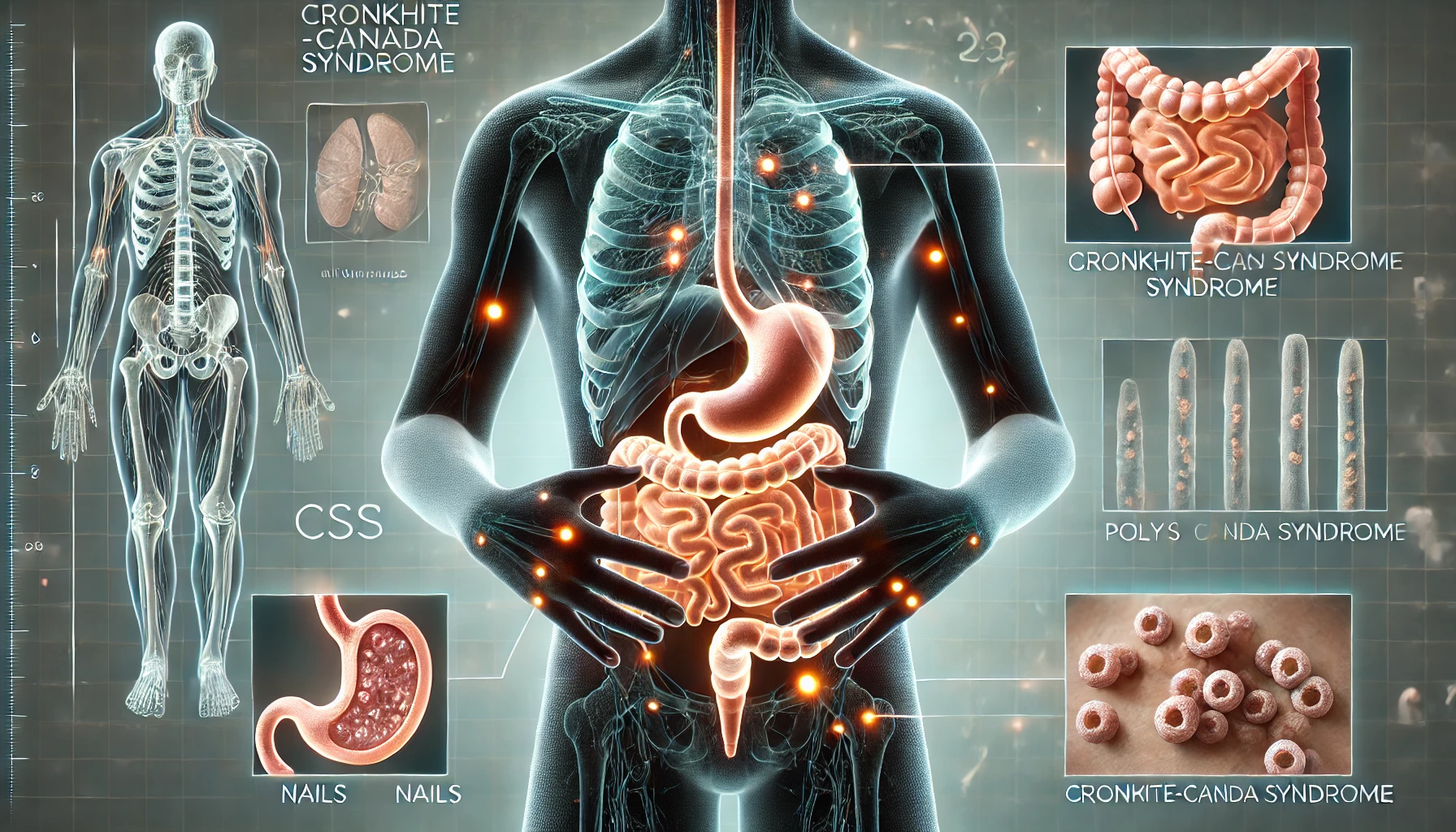Cronkhite-Canada syndrome (CSS): Description, Causes, and Treatment Protocol
Description
In 1955, Wilma J. Canada and Leonard W. Cronkhite Jr. initially identified the rare, non-inherited gastrointestinal condition known as CSS. CSS is distinguished by a particular clinical trio of alopecia, i.e., hair loss, gastrointestinal polyps, and onychodystrophy, i.e., nail abnormalities, which is frequently accompanied by numerous systemic symptoms and consequences. Even though CSS is not prevalent, diagnosing and treating it can be difficult due to its complicated clinical presentation and unclear cause. In contrast to other gastrointestinal illnesses, CSS has a distinctive combination of symptoms and pathological traits. The hallmark symptoms and indications of CSS include: –
Alopecia: In CSS, both the body and scalp experience profuse hair loss. Mental discomfort can result from this hair loss, which can be severe.
Gastrointestinal Polyps: The growth of hamartomatous polyps within the intestines and stomach is the primary characteristic of CSS. These benign growths may result in bleeding, diarrhea, and stomach pain.
Onychodystrophy: CSS frequently results in ridges, pitting, and discoloration in the nails. The nails could become fragile and breakable.
Skin and Mucosal Modifications: Patients might experience changes in skin pigmentation along with gastrointestinal and oral mucosal abnormalities.
Diarrhea and Malabsorption: A common side effect of CSS is chronic diarrhea, which impairs vitamin absorption and can cause nutritional deficits and weight loss.
Systemic Symptoms: Systemic symptoms like anorexia, weakness, and exhaustion might appear alongside CSS.
Risk of Complications: The presence of polyps in patients with CSS increases their risk of complications, including infections, electrolyte abnormalities, and gastrointestinal bleeding.
You May Also Like:
Chronic autoimmune urticaria: Description, Causes, and Treatment Protocol
CREST syndrome | Limited cutaneous systemic sclerosis: Description, Causes, and Treatment Protocol
Cronkhite-Canada syndrome (CSS): Description, Causes, and Treatment Protocol is an original (MedNewsPedia) article.
Possible Causes
In addition to hair loss, gastrointestinal polyps, abnormalities of the nails, and systemic signs, Cronkhite-Canada Syndrome (CSS) is an uncommon and severe gastrointestinal condition. The precise cause of CSS is still unknown, despite intensive investigation. Although many explanations and putative causes have been proposed, none have received firm scientific support. The following are some of the CSS’s potential causes and contributing factors: –
Inflammatory Processes: The formation of CSS is hypothesized to be influenced by chronic gastrointestinal inflammation. Inflammation may be a factor in CSS patients’ mucosal alterations and the existence of inflammatory cells in the polyps, which suggests a possible connection between the two.
Autoimmune Mechanisms: Some scientists hypothesize that autoimmune disease may play a role in CSS. When the immune system unintentionally targets the body’s own tissues, autoimmune disorders develop. In CSS, it is suggested that gastrointestinal polyps could form as a result of an autoimmune reaction. This hypothesis is supported by the discovery of autoimmune markers in some CSS patients.
Genetic Susceptibility: Although CSS is not thought to be a hereditary ailment, genetic factors may nevertheless affect a person’s vulnerability to the condition.
Infectious Agents: Infections, especially those caused by bacterial or viral agents, have been thought to cause or aggravate CSS. However, the syndrome has not consistently been linked to any one pathogenic organism. If infections might contribute to CSS development, research is still being done in this area.
Environmental Factors: Environmental variables that may contribute to CSS include nutrition and exposure to pollutants. Some scientists have looked into the possibility that specific dietary elements or environmental exposures may either cause or worsen the condition.
Immune Dysregulation: CSS might involve immune system dysfunction, resulting in an aberrant reaction to environmental stimuli or self-antigens. This immunological dysregulation may lead to gastrointestinal tract polyp development and persistent inflammation.
Hormonal Factors: Some academics have looked at hormonal aspects of CSS, including hormonal imbalances. Nevertheless, the evidence is scant, and more study is required.
Stress and Psychological Aspects: Numerous digestive disorders can be made worse by stress and psychological causes. Stress may aggravate CSS symptoms, but it is unusual for it to become the only factor.

Exacerbating and Mitigating Factors
Multiple factors can either enhance or lessen the symptoms of CSS, which is a complex condition. Those factors are as follows: –
The exacerbating factors for CSS include the following: –
Infection: In rare circumstances, infections can exacerbate CSS symptoms and raise the risk of immunosuppression-related consequences.
Stress: Intestinal discomfort and hair loss are two CSS symptoms that can be made worse by psychological stress.
Noncompliance with Treatment: The condition may grow and develop consequences if the suggested therapies are not followed.
Inadequate Nutrition: In CSS patients, malabsorption and nutritional deficits might get worse due to poor diet or dietary choices.
The mitigating factors for CSS include the following: –
Regular Medical Monitoring: For monitoring illness progression and modifying treatment as necessary, routine health assessments and follow-up consultations are crucial.
Stress Management: Several CSS symptoms may be reduced by stress management approaches, including meditation and counseling.
Compliance with Treatment: Effective CSS management requires strict adherence to the prescribed drugs and therapy.
Dietary Modification: In CSS patients, a nutritious, well-balanced diet can improve general health and lessen the symptoms of malabsorption.

Standard Treatment Protocol
The goal of the typical Cronkhite-Canada Syndrome treatment plan is to reduce symptoms, avoid complications, and enhance the patient’s general quality of life. The following elements are frequently present: –
Nutritional Support: Due to gastrointestinal polyps and recurrent diarrhea, CSS frequently causes malabsorption and nutritional deficits. The foundation of treatment is nutritional assistance, which entails: –
Supplementation
To treat deficiencies, doctors frequently advise patients to take vitamin and mineral supplements. This may involve taking supplements of zinc, calcium, vitamin D, iron, and vitamin B12.
Protein Supplementation
Patients with CSS who use protein supplements can keep their muscle mass and avoid protein deficiencies.
Corticosteroids: The main pharmacological therapy for CSS is high-dose corticosteroid treatment, most frequently with prednisone. Corticosteroids inhibit intestinal inflammation, which helps to relieve gastrointestinal problems. However, prolonged usage of corticosteroids is linked to a number of negative effects, such as the following: –
Immunosuppression
Corticosteroids may affect immune function, leaving patients more vulnerable to infections. Patients require caution when exposed to infectious diseases.
Weight Gain
To control weight gain brought on by corticosteroid therapy, CSS patients should maintain a healthy diet and exercise regularly.
Osteoporosis
Monitoring and protective measures for patients on perpetual corticosteroids may be necessary.
Immunosuppressive Medications: Immunosuppressive medications may be used when corticosteroids are ineffectual or poorly tolerated. The following immunosuppressive drugs are frequently prescribed for CSS: –
Azathioprine
An immunosuppressant called azathioprine can assist CSS patients in managing their autoimmune response. It is utilized in place of or in addition to corticosteroid therapy.

Mycophenolate Mofetil
Another immunosuppressive drug that might be used to treat CSS is mycophenolate mofetil.
Antibiotics: To treat or stop secondary bacterial infections, doctors may prescribe antibiotics like ciprofloxacin or metronidazole. Such infections are more likely to occur in CSS patients with weakened immune systems.
Proton Pump Inhibitors (PPIs): To regulate gastric acid production, doctors give proton pump inhibitors (PPIs) such as omeprazole and pantoprazole. These medications aid in the relief of high stomach acid-related symptoms like indigestion and heartburn, which are frequent in CSS patients.
Regular Monitoring: The disease course, nutritional state, and therapeutic response in CSS patients must be closely monitored. The following are involved: –
Blood Tests
Inflammatory indicators, liver function, and dietary deficits are evaluated through routine blood testing.
Endoscopic Evaluations
Monitoring the existence and growth of gastrointestinal polyps requires routine endoscopic examinations.
Radiological Imaging
The degree of gastrointestinal involvement might be assessed by imaging investigations like CT scans.

Treatment Options
To control certain symptoms and enhance a patient’s general health in CSS, adjunct treatment methods might be taken into account in alongside the usual treatment plan. Among them are the following: –
Over-the-Counter (OTC) Formulations: These include the following: –
Anti-Diarrheal Medications
Diarrhea, a typical CSS symptom, can be temporarily treated with over-the-counter anti-diarrheal drugs like loperamide (Imodium).
Iron Supplements
Anemia, which is prevalent among CSS patients as a result of persistent gastrointestinal malabsorption and bleeding, can be treated with OTC iron supplements.
Multivitamins and Minerals
Mineral supplements and multivitamins sold OTC can promote general well-being and correct specific deficiencies.
Nutritional Supplements: These include: –
Folate and Biotin
Biotin and folate supplements may promote healthy hair and nails, resolving some of the CSS-related aesthetic issues.
Omega-3 Fatty Acids
Supplemental omega-3 fatty acids may be anti-inflammatory and may benefit CSS patients with their inflammation.
Enhance your body’s healing and manage inflammation with Omega-3—Support Your Recovery, Shop Now!

Herbal and Natural Remedies: Even though they cannot replace medical care, natural and herbal therapies may have additional advantages. Some CSS patients investigate the following possibilities: –
Turmeric
The main ingredient in turmeric, curcumin, possesses antioxidant and anti-inflammatory properties. Turmeric consumption may assist in lessening inflammation.
Aloe Vera
Due to its anti-inflammatory qualities, aloe vera gel can help with gastrointestinal irritation. For skin complaints, it can be ingested as a beverage or used topically.
Probiotics
Beneficial bacteria-rich probiotic supplements may promote gut health and reduce gastrointestinal discomfort in CSS patients.
However, when given a diagnosis of CSS, patients should collaborate closely with medical providers to customize the treatment they receive to meet their unique needs and maintain ongoing condition monitoring. To maximize results and reduce complications, CSS management may call for constant modifications to nutritional assistance and drug dosing.
Conclusion
Cronkhite-Canada Syndrome (CSS) is a rare and complex condition characterized by gastrointestinal polyps, alopecia, nail abnormalities, and systemic symptoms. Despite its rarity, CSS poses significant diagnostic and therapeutic challenges due to its multifaceted presentation and unclear etiology. While the precise causes remain unknown, factors such as autoimmune mechanisms, inflammation, and potential environmental triggers are under investigation.
Effective management of CSS requires a multidisciplinary approach that includes nutritional support, corticosteroid therapy, and regular monitoring for complications such as infections, malabsorption, and gastrointestinal bleeding. Adjunct therapies, including immunosuppressants and natural remedies, may provide additional symptom relief but must be used under medical supervision. Lifestyle modifications, dietary adjustments, and stress management can also help mitigate symptoms and improve overall quality of life.
Continued research into the underlying mechanisms and innovative treatment strategies is essential to enhance patient outcomes. Collaboration between healthcare providers and patients is crucial for tailoring treatment plans, ensuring early intervention, and optimizing long-term care for this challenging condition.

Additional resources for further reference
https://www.ncbi.nlm.nih.gov/pmc/articles/PMC3365526
https://rarediseases.org/rare-diseases/cronkhite-canada-syndrome
https://www.ncbi.nlm.nih.gov/pmc/articles/PMC9128335/
Important Note: The information contained in this article is for general informational purposes only, and should not be construed as health or medical advice, nor is it intended to diagnose, prevent, treat, or cure any disease or health condition. Before embarking on any diet, fitness regimen, or program of nutritional supplementation, it is advisable to consult your healthcare professional in order to determine its safety and probable efficacy in terms of your individual state of health.
Regarding Nutritional Supplements Or Other Non-Prescription Health Products: If any nutritional supplements or other non-prescription health products are mentioned in the foregoing article, any claims or statements made about them have not been evaluated by the U.S. Food and Drug Administration, and such nutritional supplements or other health products are not intended to diagnose, treat, cure, or prevent any disease.


